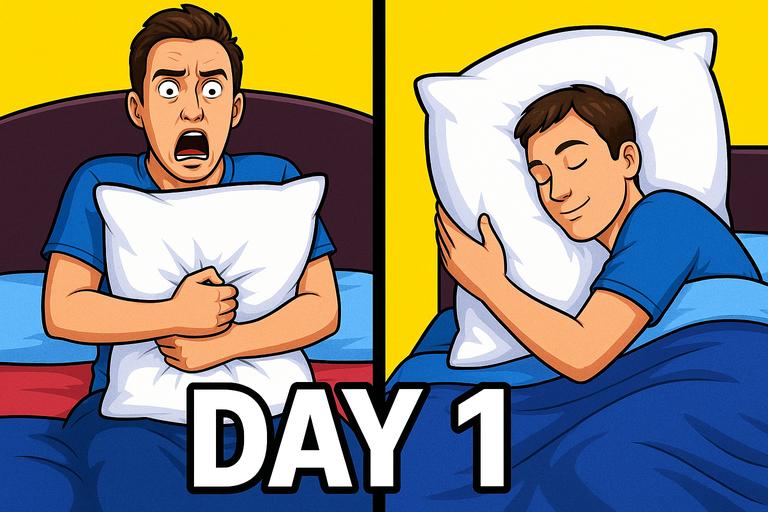7 Surprising Foods That Could Make You Snore Less Tonight
Can what you eat actually silence your snore? It sounds like one of those too-good-to-be-true claims, but recent insights suggest your dinner plate might be more powerful than you think when it comes to catching those precious Zs — and snoring less. If you or your partner have ever played the nightly game of 'Who’s snoring louder?' then this article is your new bedtime buddy.
So, here’s the million-dollar question: Can munching on the right foods before bedtime stop that disruptive snore? According to a fascinating read on CNET titled “Want Better Sleep? These Are the Best Foods to Eat Before Bed”, the answer might well be yes. Let's dive into the surprising ways certain foods can impact your sleep quality — and snoring — and what you should avoid if you want to snooze silently.
Why Does Food Affect Snoring Anyway?
Before we get to the yummy stuff, let’s understand the why. Snoring mainly happens when the airway is partially blocked during sleep, causing that annoying rattling. Factors like congestion, muscle relaxation, and inflammation can all play a role.
And guess what? The foods you eat influence these factors. For example, alcohol and heavy meals relax muscles and add to congestion, making snoring worse. On the flip side, some foods help clear airways, reduce inflammation, and promote better muscle tone.
7 Foods to Help Silence the Snore Symphony
Here’s a sneak peek at seven game-changing foods (and why they work):
Cherries – Packed with melatonin, these little red beauties help regulate your sleep cycle, which can reduce restless nights and snoring.
Almonds – Rich in magnesium, almonds relax the muscles in your airway without the heavy sedation effects of alcohol.
Kiwi – This fruity friend is shown to improve sleep quality and help reduce sleep disruptions.
Bananas – High in potassium, they prevent muscle cramps and help maintain muscle tone in your throat.
Honey – A teaspoon before bed soothes your throat, reducing irritation that might cause snoring.
Yogurt – The probiotics support a healthy immune system that fights off the congestion leading to snoring.
Leafy greens – Think spinach and kale; these anti-inflammatory powerhouses reduce nasal congestion.
Sounds simple enough, right? But what about the foods to dodge?
The Snore-Trigger Foods to Skip Before Bed
- Alcohol: It relaxes throat muscles too much, opening the gates for snoring.
- Heavy, fatty meals: These slow digestion and worsen congestion.
- Dairy (in excess): For some, it causes mucus buildup, increasing airway blockage.
Beyond Food: The Missing Piece in Your Snoring Puzzle
Now, adjusting your diet is a fantastic step, but tackling snoring often requires a multi-pronged approach. While foods can reduce inflammation and congestion, physical airway support is key.
This is where innovative solutions like the Snorple Anti-Snoring Mouthpiece come into play. It’s a customizable, hypoallergenic mouthpiece that gently repositions your jaw and tongue to keep your airway clear all night long. With over 100,000 customers singing its praises, adjustable settings, and even a microwave-friendly preparation method, it’s designed for real comfort and real results.
Think of it as your food’s best friend in the fight against snoring — one preps your body from inside, the other supports structurally to keep the snore monster at bay.
Putting It All Together for Your Best Night’s Sleep
Try incorporating these sleep-friendly foods into your evening routine and pair that with a smart, comfortable mouthpiece. You’ll be giving yourself a double whammy against snoring.
And don’t just take my word for it. Check out the detailed insights on these foods in the original CNET article and see how nutrition experts connect the dots between diet and sleep health.
Final Thought: Ready to Stop Snoring and Start Snoring?
What if the key to peaceful nights was not just what you sleep with but also what you eat before hitting the pillow? Imagine your partner giving you a thumbs-up instead of a pillow punch!
Have you tried changing your bedtime snacks or using any anti-snoring devices? What worked—or didn’t? Spill your sleep secrets below. Let's make snoring a thing of the past, one bite and one biteguard at a time.
Sweet silent dreams!
Note: If snoring persists despite lifestyle changes, it’s wise to consult a sleep specialist to rule out conditions like sleep apnea.
